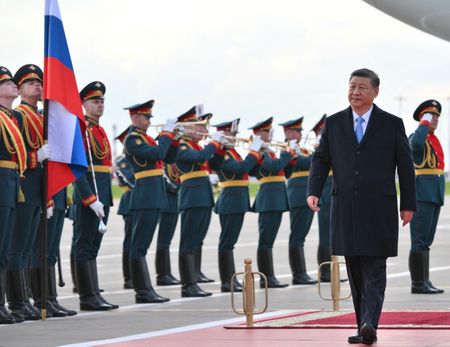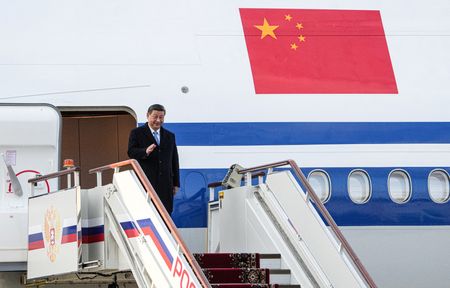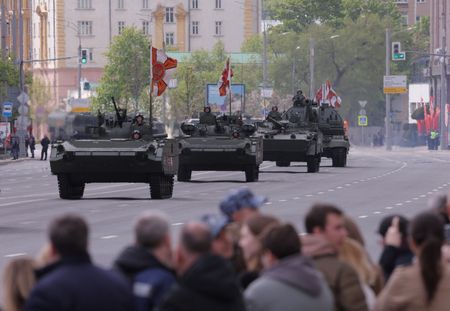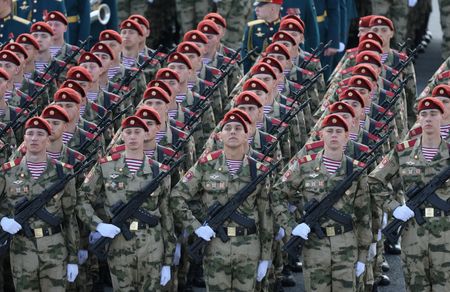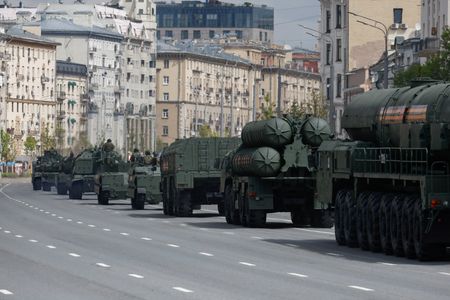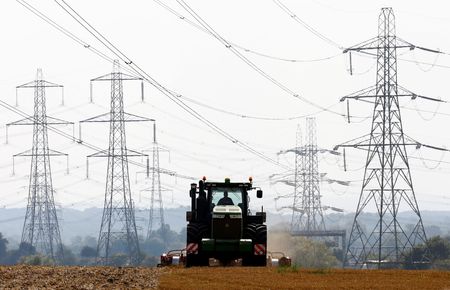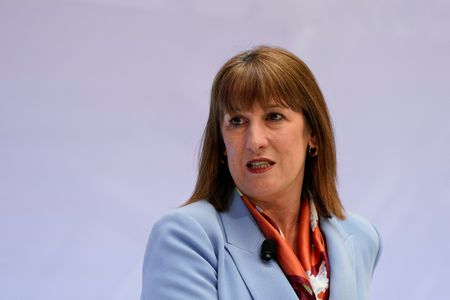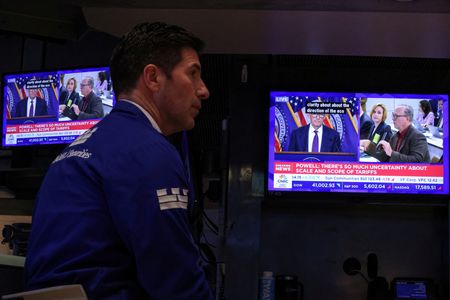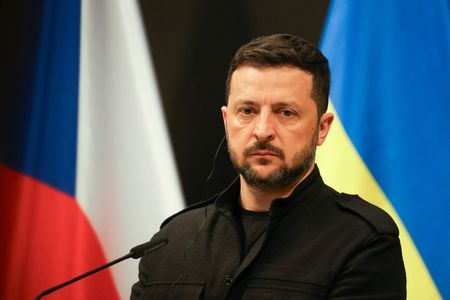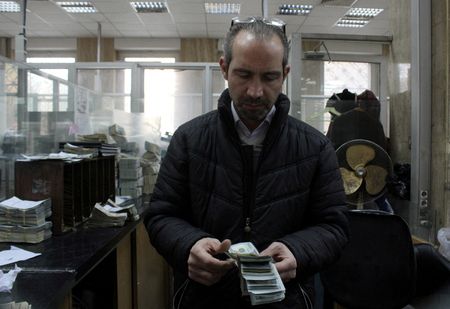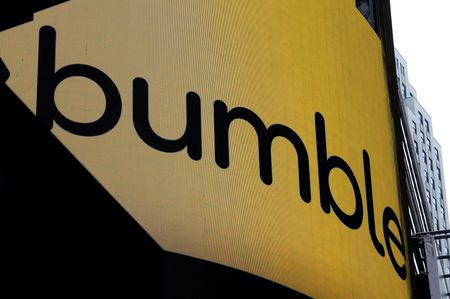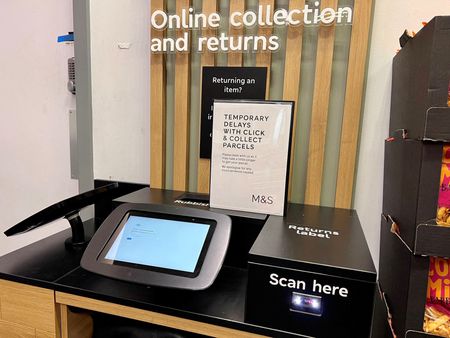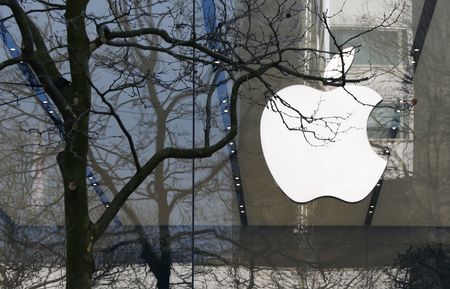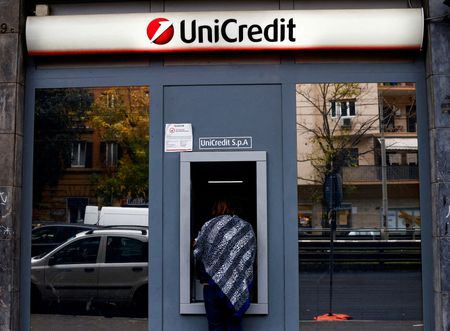By Andrew Osborn and Laurie Chen
(Reuters) -Chinese President Xi Jinping flew into Moscow on Wednesday for talks with President Vladimir Putin and a pomp-filled visit that Kyiv has made clear it opposes after Ukrainian drones targeted Moscow shortly before he touched down.
Xi, whose country buys more Russian oil and gas than any other, and which has thrown Moscow an economic lifeline that has helped it navigate Western sanctions imposed over its war in Ukraine, landed at Moscow’s Vnukovo-2 airport soon after Russian authorities said they had brought down another Ukrainian drone outside the capital.
It was the third day Ukraine has targeted Moscow with drones and one of Moscow’s main airports was forced to temporarily suspend its activities less than three hours before Xi’s arrival.
When asked during a news briefing about air attacks by both sides on each others’ capitals, a spokesperson for the Chinese foreign ministry did not comment on Xi’s trip, saying only that the “top priority” was to avoid an escalation in tensions.
The Kremlin said the attempted Ukrainian attacks on Moscow showed Kyiv’s tendency to commit “acts of terrorism” and that Russia’s intelligence services and military were doing everything necessary to ensure the security of upcoming World War Two commemorations which Xi is due to attend.
Ukrainian officials said on Wednesday that Russia had launched its own air attack on Kyiv overnight, killing a mother and her son. Russia says it only targets military objects.
Xi is the most powerful world leader expected at a military parade on Moscow’s Red Square on Friday to mark the 80th anniversary of the victory of the Soviet Union and its allies over Nazi Germany.
His visit hands President Vladimir Putin an important diplomatic boost at a time when the Russian leader is keen to show his country is not isolated on the world stage. The Kremlin has touted Xi’s presence, along with that of 28 other world leaders, as a sign of Russia’s growing global authority.
But Ukraine’s Foreign Ministry – in comments that seemed directed at China whose troops are due to march on Red Square – on Tuesday urged countries not to send their militaries to participate in the May 9 parade, saying such participation would go against some countries’ declared neutrality in the war.
DRONES TARGETED MOSCOW
Moscow Mayor Sergei Sobyanin said that Russian air defence units had destroyed at least 14 Ukrainian drones headed for the Russian capital overnight. He later said at least two more had been brought down during the day.
Xi has called for talks to end the war in Ukraine and has accused the U.S. of stoking the war with weapons supplies to Kyiv. Ukrainian President Volodymyr Zelenskiy has in the past urged him to try to persuade Putin to end the war.
Xi is due to hold talks with the Russian leader on Thursday and to join other world leaders for the parade on Friday.
His visit comes as U.S. President Donald Trump is trying to push Moscow and Kyiv to find a way to end the war in Ukraine, with both sides blaming each other for a lack of progress.
Locked in a tariff war with the United States, Xi is expected to sign numerous agreements to deepen an already tight strategic partnership with Moscow, which has consistently seen China crowned Russia’s biggest trading partner.
Despite recent efforts under Trump to reset U.S.-Russia ties, Putin is expected to present a united front with Xi against Washington, whose dominance and “exceptionalism” both countries have questioned, arguing for a more multipolar world.
POST-WAR INTERNATIONAL ORDER
In a signed article published by Russian media on Wednesday, Xi wrote that China and Russia must “firmly maintain the post-war international order.”
“The two sides should jointly resist any attempt to disrupt and undermine China-Russia friendship and mutual trust,” read the text of the article, Chinese state media reported.
Russian Foreign Ministry spokesperson Maria Zakharova called the visit “one of the central events in Russian-Chinese relations this year.”
“The World War Two focus is about the post-war international order and now the U.S. is dismantling or undermining it. So China and Russia will frame themselves as the defenders of the international order and the UN system, and oppose U.S. unilateralism and hegemony,” said Yun Sun, a China politics analyst at the Stimson Center in Washington.
In their talks, Putin and Xi will discuss the “most sensitive” issues, including energy cooperation and the proposed but yet to be built Power of Siberia 2 gas pipeline to China, Yuri Ushakov, a top Kremlin aide, said.
(Reporting by Andrew Osborn; Additional reporting by Laurie Chen and Liz Lee in Beijing and by Dmitry Antonov in MoscowWriting by Andrew OsbornEditing by Tomasz Janowski, Lincoln Feast, Sharon Singleton, William Maclean)

